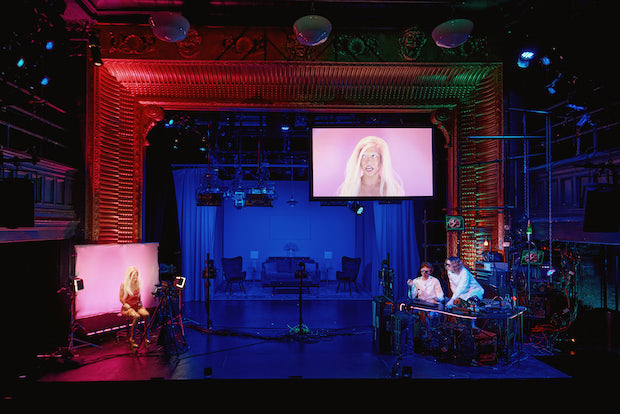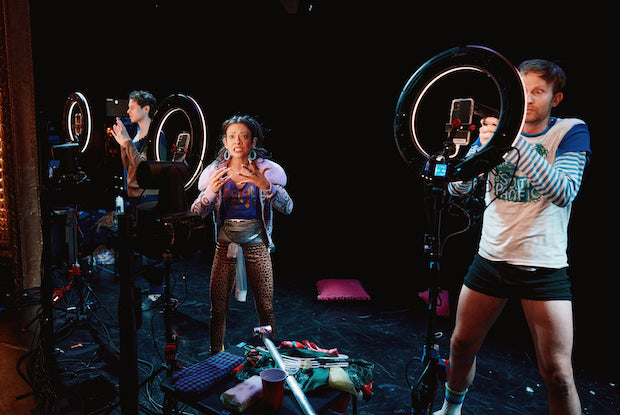Review: Circle Jerk Is a Stupid Play That Should Be Canceled
Fake Friends take the off-Broadway stage, without leaving the Internet behind.

(© Emilio Madrid)
I know, I know: TheaterMania never posts positive reviews! But is that true? Or is it the case that you only engage with the negative ones, causing the algorithm to populate even more angry, poisonous content to your news feed as you rage scroll? If you're reading this, chances are I've tricked the Zuckerberg machine into promoting (and you into clicking) this review of Circle Jerk, the spectacular Internet farce currently making its live and in-person debut at the Connelly Theatre. Ignore the click-bait headline. This is the smartest, funniest comedy to come out of the pandemic, when the obsessive habits of the very online reached new extremes — making them prime targets for manipulation.
Circle Jerk made its 2020 debut in an exclusively online format, which was about all that was available at the time. Rather than giving audiences a poor substitute for live theater (which so many streaming shows are), the creators of Circle Jerk were able to tell their story on the screens and through the memes that constitute the Internet culture they so gleefully skewer. It earned a surprise Pulitzer nod for its writer-performers, Michael Breslin and Patrick Foley. Under the banner of the scrappy troupe Fake Friends (that's Breslin and Foley in collaboration with actor Cat Rodríguez and dramaturg Ariel Sibert), they now present it in front of a live studio audience while continuing to stream online using a multi-cam setup. Seeing it in person feels like attending a taping of the lost gay episode of I Love Lucy.

(© Emilio Madrid)
It's about Patrick (Foley), an actor who travels to Gaymen Island against the advice of his best frenemy Michael (Breslin), a guy with all the correct political opinions who is married, we are told, to a "diverse husband." Michael knows that Gaymen is the lair of meme-producing homosexual supervillain Jurgen Yionoullis (also Foley), with whom Patrick has been having an online flirtation. Patrick expects to party with the gay glitterati, but instead he finds the island practically deserted: The only people left are Jurgen, his incel maid Honney (Breslin), and Jurgen's co-conspirator Lord Baby Bussy (Breslin).
Jurgen can't even bother to make time for this long-distance booty call. He's been canceled, and he is hell-bent on revenge. He and Bussy hatch a plot to cleanse America of everyone but white gay men by fabricating the world's most irresistible influencer, Eva María (Cat Rodríguez, terrifyingly embodying this Frankenstein monster with pink highlights). With the face of an ethnically ambiguous twentysomething, the voice of an Amazon Alexia [sic], and a brain composed of the world's biggest cache of personal data, she's going to convince everyone to either go homo or kill themselves.

(© Emilio Madrid)
All that is established in just the first act of this three-act comedic hurricane, which employs an elaborate combination of live and recorded video (ingeniously designed by David Bengali, and flawlessly executed by Ted Charles Brown and Stivo Arnoczy). Breslin and Foley quick-change in and out of costumes (by Cole McCarty) and wigs (by Tommy Kurzman) in order to play nearly every character, including a repulsive blue-haired troll (Foley) that speaks in rhyming verse.
Stephanie Osin Cohen has designed a full living room set upstage for the broadcast, but the in-person audience can also see the complicated technical equipment it takes to make it work. Director Rory Pelsue has choreographed both the on-camera and off-camera business with precision, so watching how they pull it off is half the fun. Most importantly, the technical competence of the production (stage-managed by Codey Leroy Butler) allows the actors to deliver performances that are irresistible in their outrageous extremity.
Fans of Charles Ludlam's Ridiculous Theatrical Company will recognize in both the Gothic vibe and quick-change theatricality a nod to The Mystery of Irma Vep; however, Circle Jerk's anarchic social satire is reminiscent of Ludlam's earlier work, like Turds in Hell and Conquest of the Universe — plays written for an audience of outsiders disillusioned by the humorless mainstream culture. No one is safe from ridicule. The unlikely central plot pokes fun at the extremely online, who assume that theirs is the only world that matters. And even the title reveals a group of creatives undaunted by Google's porn filters, which is pretty punk rock in the age of SEO.

(© Emilio Madrid)
The tour de force third act is told through a kind of TikTok expressionism, with the actors accenting dramatic beats with Internet clichés and quite a bit of energetic dancing. Capone's "Oh No" makes an appearance, but there are also deeper cuts, like Marla Mindelle singing "Colors of the Wind" to express how one character is grappling with her indigenous roots (or lack thereof). If you catch the references, you might laugh a little bit harder, secure in your superior knowledge of Internet bullshit. Or you might just laugh anyway, lest anyone suspect you don't get it — and that is also part of the storytelling.
Much of Circle Jerk is about how so-called content creators (a term that makes all writers sound like employees in a Twinkie factory) strategically flatter the vanity and prick the insecurities of their followers in order to sell them things — clothing, cryptocurrency, politicians. Rather than breathlessly dramatizing our era of Russian trolls and disinformation, Circle Jerk does something even better: It makes us laugh. And in doing so, it offers the best response to an online culture that takes itself way too seriously.









